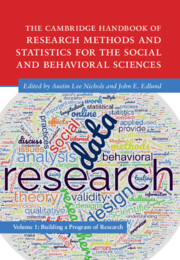 The Cambridge Handbook of Research Methods and Statistics for the Social and Behavioral Sciences
The Cambridge Handbook of Research Methods and Statistics for the Social and Behavioral Sciences Book contents
- The Cambridge Handbook of Research Methods and Statistics for the Social and Behavioral Sciences
- Cambridge Handbooks in Psychology
- The Cambridge Handbook of Research Methods and Statistics for the Social and Behavioral Sciences
- Copyright page
- Dedication
- Contents
- Figures
- Tables
- Contributors
- Preface
- Part I From Idea to Reality: The Basics of Research
- Part II The Building Blocks of a Study
- Part III Data Collection
- Part IV Statistical Approaches
- Part V Tips for a Successful Research Career
- 29 Designing a Line of Research
- 30 Successfully Publishing Research in the Social and Behavioral Sciences
- 31 Presenting Your Research
- 32 Building Fruitful Collaborations
- 33 Performing a Good Peer Review
- 34 Handling Submitted Manuscripts: As Editor and Author
- 35 Grant Writing Basics
- 36 Teaching Research Methods and Statistics
- 37 Working Outside Academia
- Index
- References
31 - Presenting Your Research
from Part V - Tips for a Successful Research Career
Published online by Cambridge University Press: 25 May 2023
- The Cambridge Handbook of Research Methods and Statistics for the Social and Behavioral Sciences
- Cambridge Handbooks in Psychology
- The Cambridge Handbook of Research Methods and Statistics for the Social and Behavioral Sciences
- Copyright page
- Dedication
- Contents
- Figures
- Tables
- Contributors
- Preface
- Part I From Idea to Reality: The Basics of Research
- Part II The Building Blocks of a Study
- Part III Data Collection
- Part IV Statistical Approaches
- Part V Tips for a Successful Research Career
- 29 Designing a Line of Research
- 30 Successfully Publishing Research in the Social and Behavioral Sciences
- 31 Presenting Your Research
- 32 Building Fruitful Collaborations
- 33 Performing a Good Peer Review
- 34 Handling Submitted Manuscripts: As Editor and Author
- 35 Grant Writing Basics
- 36 Teaching Research Methods and Statistics
- 37 Working Outside Academia
- Index
- References
Summary
Research presentations offer personal, interpersonal, and professional benefits to students and more senior researchers. Through presentations, students gain important skills (e.g., analytic thinking), are able to meet potential mentors and/or employers, and develop their identities as scholars in a given field. Senior researchers may see increases in motivation, productivity, and collaborative opportunities. Various avenues for presenting one’s work include institutional based, regional, national, and international conferences. Readers are encouraged to reflect on logistics and personal and professional goals when deciding on which conference is right for them. Descriptions of poster presentations, oral presentations, and job talks are provided. Subsequently, this chapter offers practical guidance on “best practices” for presenting one’s research in each respective modality. Readers are encouraged to reflect on the composition of their audience, the goals of their presentation, and the visual organization of material to craft the most effective presentation possible.
Keywords
- Type
- Chapter
- Information
- The Cambridge Handbook of Research Methods and Statistics for the Social and Behavioral SciencesVolume 1: Building a Program of Research, pp. 671 - 694Publisher: Cambridge University PressPrint publication year: 2023


